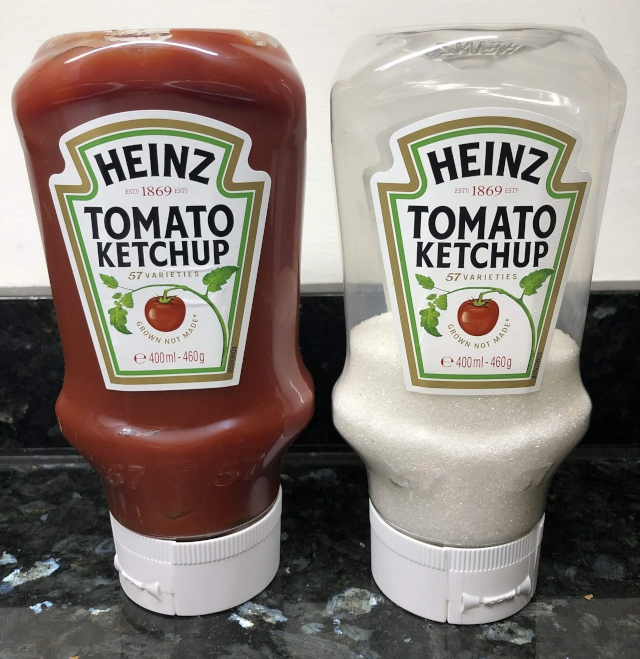The war against obesity – and the host of other serious diseases and conditions it’s associated with – slogs on. But researchers have been making some serious inroads on the obstinate issue over the past year or so. Now, scientists have put numbers on the damage added sugar does…
 It’s not just sugary drinks: The added sugar in many other packaged/processed foods is
It’s not just sugary drinks: The added sugar in many other packaged/processed foods is
just as bad or worse. Visit SimpleAsFat.com for the gruesome details. (Heinz is
just one ketchup. They all have about the same amount of added sugar.)
Yes, there really is a U.S. National Salt and Sugar Reduction Initiative (NSSRI). It’s a coalition of more than 100 local, state and national health organizations convened by the New York City Department of Health. NSSRI has published recommended reductions in added sugar content in 15 categories of packaged foods, and released a policy which calls on food processors and packagers to voluntarily reformulate their sugar-laden products.
Experience has shown that voluntary programs just don’t work with industry, unless there’s a huge payload of good publicity to be had by following them. Maximizing profit to the shareholders will always win out over good corporate citizenship. Researchers at Massachusetts General Hospital (MGH) have no illusions:
“Implementing a national policy, however, will require government support to monitor companies as they work toward the targets and to publicly report on their progress. The researchers hope their model will build consensus on the need for a national-sugar reformulation policy in the US.”
What they did
Researchers created a statistical model to simulate and quantify the health, economic, and equity impacts of a pragmatic sugar-reduction policy. In simple English, that means they wanted to show, in dollars, health emergencies and health care costs, what added sugar costs society every year. They used the NSSRI reduction goals as targets.
What they found
According to an abstract of the study report: “Cutting 20 percent of sugar from packaged foods and 40 percent from beverages could prevent 2.48 million cardiovascular disease events (such as strokes, heart attacks, cardiac arrests), 490,000 cardiovascular deaths, and 750,000 diabetes cases in the U.S. over the lifetime of the adult population. […] Ten years after the NSSRI policy goes into effect, the U.S. could expect to save $4.28 billion in total net healthcare costs, and $118.04 billion over the lifetime of the current adult population (ages 35 to 79), according to the model. Adding the societal costs of lost productivity of Americans developing diseases from excessive sugar consumption, the total cost savings of the NSSRI policy rises to $160.88 billion over the adult population’s lifetime. These benefits are likely to be an underestimation since the calculations were conservative. The study also demonstrated that even partial industry compliance with the policy could generate significant health and economic gains.”
The takeaway
Cutting 20 percent of sugar from packaged foods and 40 percent from beverages could prevent 2.48 million cardiovascular disease events (such as strokes, heart attacks, cardiac arrests), 490,000 cardiovascular deaths, and 750,000 diabetes cases in the U.S. over the lifetime of the adult population.
“We hope that this study will help push the reformulation initiative forward in the next few years,” says Dr. Siyi Shangguan, lead author of the report. “Reducing the sugar content of commercially prepared foods and beverages will have a larger impact on the health of Americans than other initiatives to cut sugar, such as imposing a sugar tax, labeling added sugar content, or banning sugary drinks in schools.”
My take
I applaud wholeheartedly with the study findings, which which set out in clear black-and-white dollars-and-cents terms the beneficial effects that could be realized by dramatically reducing added sugar in packaged and processed foods and beverages. Millions of people could be spared the suffering or death caused by heart attacks, strokes, diabetes and other obesity-related afflictions.
And the money saved could be repurposed toward helping meet the climate change challenge, and ensuring we have a sustaining and sustainable food supply through the second half of this century and beyond.
Can the processed food and beverage industry met the NSSRI challenge? Easily. All they have to do is replace an appropriate amount of the sugar they now use in their products with non-nutritive sweeteners. Or they could simply replace added sugar altogether with naturally-sourced sweeteners like stevia, and totally short-circuit the obesity machine. yes. I know stevia is expensive – really nothing more than a boutique novelty – at this point in history. But if the sugar producers switched from cane to stevia, the cost of the latter would come down considerably in no time at all, thanks to the magic of mass production.
But human nature and corporate shareholders being what they are, I also agree with the study authors that government ‘support’ and supervision will be needed to make implementation of the NSSRI goals a reality.
~ Maggie J.

